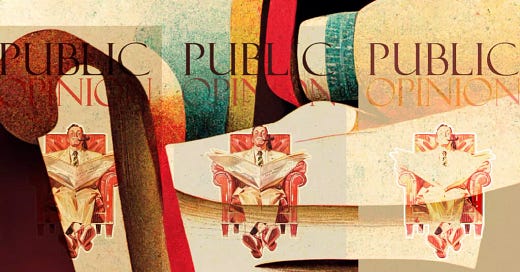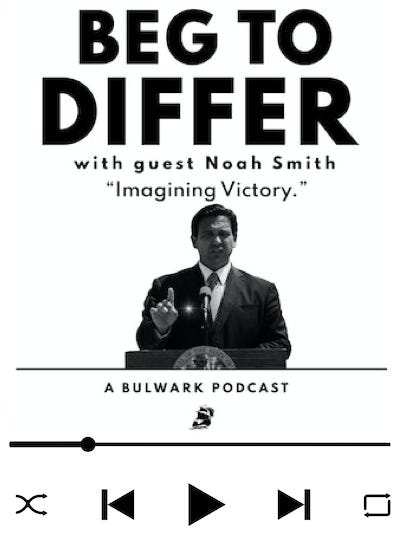Recently at The Bulwark:
CHARLIE SYKES: The Cruelty and the Crazy
JVL: The GOAT Walks Away 🔐
SONNY BUNCH: ‘The Woman King’ Review.
SECRET POD: Make Your Own Caravan. 🔐
BGTH: Prime Video, a Fully Armed and Operational Streaming Network. 🔐
You can support The Bulwark by subscribing to Bulwark+ or just by sharing this newsletter with someone you think would value it.
ANDRÉ FORGET: Public Opinion at 100.
One hundred years ago, a young American journalist named Walter Lippmann published a book called Public Opinion. Though it is one of the most important books of the twentieth century and still acknowledged as a foundational text in the study of social psychology, media, and propaganda, its centenary has passed, for the most part, unacknowledged. This is ironic, because its central question—put simply, “How can a truly self-governing society function under the conditions of ‘mass culture’?”—has rarely been more relevant. Our current debates about disinformation and the pernicious effects of social media could be rather more productive if the participants would bother to read Lippmann—not because Lippmann provides any workable solutions, but because his analysis of the extent of the problem is so clear-eyed.
Public Opinion’s publication year, 1922, is a significant one. The book came out after four years of global war followed by four years of civil war in the former Russian, Ottoman, and Austro-Hungarian empires, a period in which information had been weaponized to a previously unimaginable extent. The government and the press, especially in the United Kingdom, had collaborated in ginning up support for the war through the publication of a number of astonishing lies—the Angels of Mons and infamous “corpse factories” being only the most flagrant. The full sense that the world had entered a new era in which reality was fragmented and the truth impossible to know was starting to be felt. Lippmann had enlisted as an intelligence officer when the United States entered the Great War in 1917, and witnessed the intimate relationship between news reporting and the war effort in France—the second chapter of Public Opinion opens with a striking account of how a roomful of French generals spent hours tinkering with the wording of a press release during the disastrous third day of the Verdun offensive. It seems the experience raised some serious doubts about the function of journalism during wartime, because upon being discharged in 1919 Lippmann immediately went to work on a series of essays castigating the press for its failure to report the news accurately and objectively.
Refugees escaping communist Venezuela are pawns in a big joke, but isn’t it brilliant political theater? -> Charlie Sykes and Tim Miller do an epic takedown of the “Nothing Matters” crowd. Plus, weird Blake Masters, putting Kemp on the spot, and Republicans: Put up or shut up on same-sex marriage.
Bulwark+ members can listen to an ad-free version of these podcasts on the player of their choice. Learn more at Bulwark+ Podcast FAQ.
🚨OVERTIME 🚨
Happy Friday! I’m reminded of the Chernobyl bus scene seeing these prison vans bring new Russian military recruits. If history is any guide, Russian bus motorcades don’t send a confident vibe.
Twitter is not real life. How the Martha’s Vineyard rich folks dealt with Ron DeSantis’s troll. Must read: Chait on this failure. Also, Gov. DeSantis may have broken the law.
It’s time… Trump supporters had “the talk” about the police.
Inside a nuclear power plant… On Long Island. Decades later, nobody knows what to do with the facility.
I want it. Is it practical? No. Is it cheap? No. Could an apartment dweller get away with it? Probably. Meet the mini-smoker.
Matt Labash… Out on the porch.
My former barber… Makes it into this profile of DHS IG Cuffari.
Stop giving Janet Yellen stamps… She does not want them.
That’s it for me. Tech support questions? Email members@thebulwark.com. Questions for me? Respond to this message.
—30—
Editorial photos provided by Getty Images. For full credits, please consult the article.








